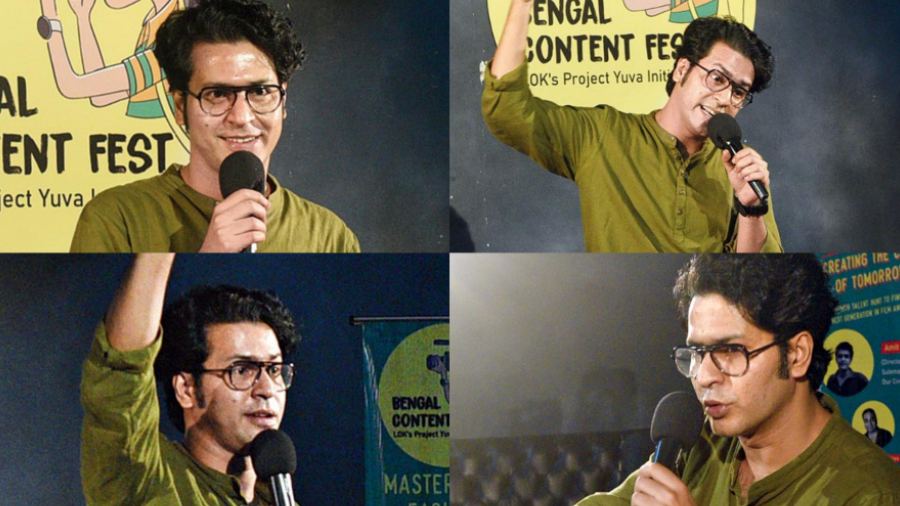Fresh from the phenomenal success of Mandaar, the web series which has won him a prestigious award for best dialogue in an OTT, actor-writer-director Anirban Bhattacharya shared his knowledge and experience of screenwriting at a masterclass attended by 160 film studies students. The workshop was recently organised as part of the Bengal Content Fest, presented by Project Yuva Initiative and supported by SVF.
Anirban began by urging students to tell stories from the heart and to reimagine older texts so as to make them relatable. According to him, the script, though a tool, forms the core of any film. Purely interactive in nature, the session covered the broad elements of screen-writing, touching upon aspects like description of visuals, settings, cues, dialogues, actions and reactions. The writer-actor touched upon various technical aspects of screen-writing and distinguished it from the method of writing scripts for a play.
He offered useful tips on how to visualise a story, how to achieve the right balance between visual and dialogue and how to decide on the script length. Anirban also discussed how screen-writing can help establish characterisation, how collaborative screen-writing is done and how to write scripts for short films.
“It was wonderful sharing my ideas and understanding about screen-writing with such an enthusiastic group of students. I was very impressed to see that they asked all the right questions and that they are so knowledgeable about cinema. I believe they have the potential to join our industry and add value to it in their own way. I wish them success. I also congratulate the organisers of Bengal Content Fest for planning this workshop and hope that such initiatives will remain a continuous process,” said Anirban.
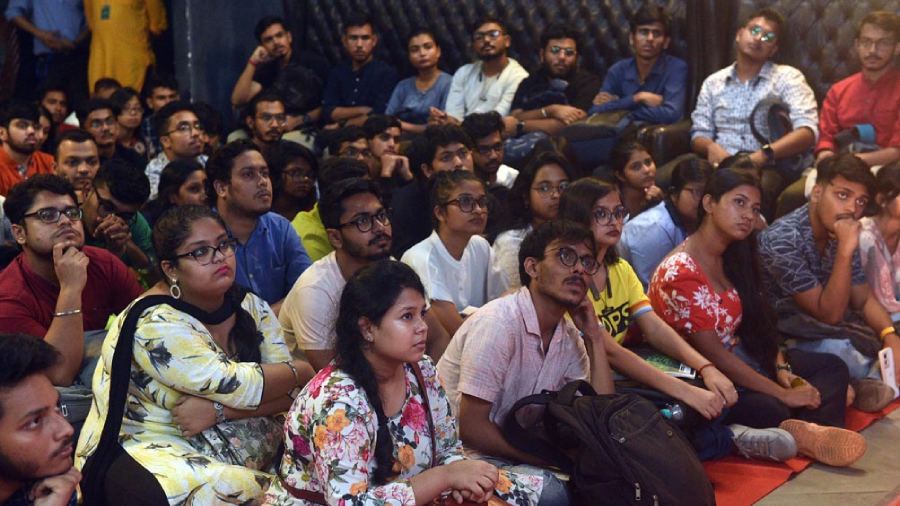
Participants of the masterclass listened in rapt attention as the writer-director shared tips with them
The Telegraph caught up with actor-writer Anirban Bhattacharya for a chat on the sidelines of the screenwriting masterclass for students. Excerpts.
Do you think that good screen-writing can transform an ordinary story into a great film narrative?
Absolutely. That is the magic of cinema, how a simple storyline can be made interesting and appealing by the use of cinematic techniques. Of course, a script cannot do this on its own. Based on a good script, it requires the extraordinary collaborative efforts of all to make a good film. Take for instance the movie Tumbbad, which has in a way revolutionised Indian cinema. It is based on a fairy tale, and has a basic storyline similar to that found in the tales in Thakurmar Jhuli. But the way the story has been conceived for cinema is remarkable, mind-blowing.
Do you think a movie can be impactful or be a commercial success even if its plot is not well-defined?
Let me put it this way. I know that, to make a film, there has to be a story. A film-maker decides what story he wants to tell. The story is peopled by certain characters, and in it, events take place one after the other. Throughout its runtime, which may span around a couple of hours, it will progress at a certain speed towards its end. There will be emotion, excitement, sorrow, tears or laughter, along the way or at the end, or whatever response the maker intends to stimulate in the viewer.
So I believe that as long as the one who is telling the tale is able to establish the desired connection with the viewer and evoke the right kind of responses that is all that should matter. Personally speaking, while watching any movie, I have never thought about its plot being weak at any point, or that any sub-plot of the film is not explored well enough!
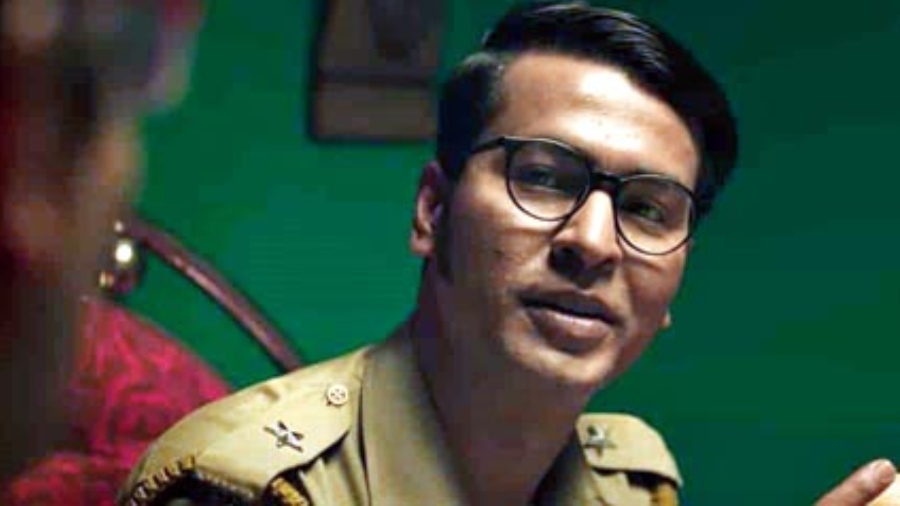
Anirban in Mandaar
Mandaar has been a huge success. Did the experience of writing for Mandaar help you in writing for Ballavpurer Roopkatha?
Oh yes, it has helped us immensely. In fact we adopted the same process for Ballavpurer Roopkatha that we had followed in Mandaar. Since the two narratives belong to completely different genres, you could say that we followed the same methods of writing for both of them. The pre-production and post-production processes of both are also the same. So in a way, Ballavpurer Roopkatha has been helped a lot from the experience gained in Mandaar, so far as its making is concerned.
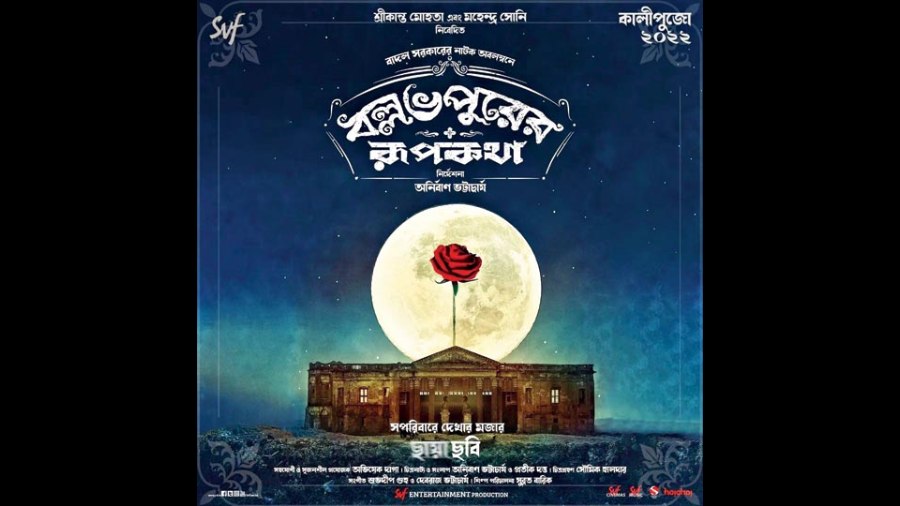
The poster of Ballavpurer Roopkatha
How did you go about adapting Ballavpurer Roopkatha, a play, for the screen?
Just the basic principle of visual distribution. In other words, we tried to strike the perfect balance between dialogue and visuals. Since the visuals in a film should communicate in a significant way, we had to make sure that spoken words expressed only that which could not be visually communicated. Also, we had try to establish a shift from the original dramatic form to the realistic format of a film. To do that through the process of screen-writing was the most challenging task.
Any directorial experience you wish to share, especially since you were working upon one of Badal Sircar’s classics?
No problems there as such since I have just tried to stick to the original text. However, I have to say that Ballavpurer Roopkatha was much more difficult to execute than Mandaar. We obtained the rhythm for Mandaar from the rhythm of the flow of water that runs as a recurrent motif in the series. Its rhythm took shape through acting, cinematography and editing. The rhythm in Ballavpur, however, was pre-determined in my mind. I was very clear what I wanted it to be. And I had to make everything fall in a pattern with that rhythm. It was an extremely tough process and I do not mind admitting it.
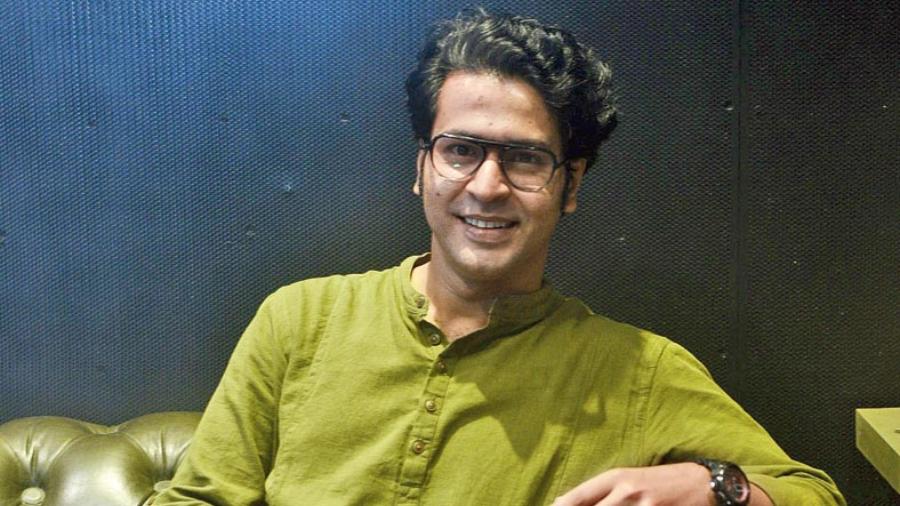
Acting, writing, directing… you are donning many hats at the same time. Is it a struggle?
(Laughs) Sometimes I feel that I am now a jack of all trades. But seriously, I feel it is enough to do just one job well at a time. Though I have multi-tasked while movie-making only twice, still I can say without a doubt that the pressure is too much. If you are trying it after a long gap, then it might be alright, but it will be very difficult to take care of so many responsibilities continuously, over a period of time. In fact it may even turn out to be harmful to the creative process.
How did you like the experience of directing yourself in a film? Is it easier, or do you prefer being directed by another?
To be honest, just being an actor makes life much easier for me. When I am acting under a director, I am working under someone’s guidance, instruction and planning. Direction is a huge responsibility and a lot of pressure, especially if you care about doing things perfectly, just the way you want it to be.
As you know, cinema depends upon a lot of mechanisms, most of which cannot be done by the director himself. A director can only communicate what he wants but the quality of the final output will depend on how well his technicians carry out his instructions. If I have to judge myself, I would say that my acting is not very good when I am directing myself. In fact, I would prefer not to act in a film where I am directing, or to not be the director in a production where I am an actor.
What is next on the anvil? Movie or web series? Acting or directing?
I would like to concentrate on acting at the moment. I have currently completed work on a project that should be out next year. Shooting for another is about to commence, while talks are on regarding others. In 2023, I hope to devote some time to the stage as well.
Pictures: Rashbehari Das

